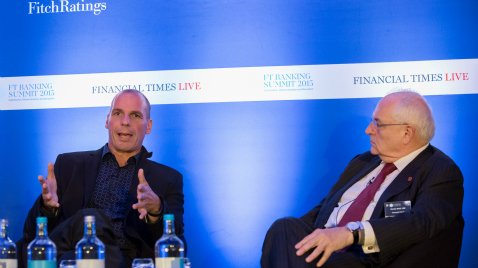Joschka Fischer who was the Green Party German Foreign Minister and Vice Chancellor from 1998-2005 has an article on the Project Syndicate website entitled “The Return of Geopolitics to Europe”
The Atlantic magazine has an interesting article entitled “Russia and the Curse of Geography – Want to understand why Putin does what he does? Look at a map” which makes a useful companion piece to Fischer’s article on Russia and European geopolitics.
In his article Joschka Fischer has this to say:
“With Russia’s military invasion and annexation of Crimea, and the subsequent war in eastern Ukraine, President Vladimir Putin has made it abundantly clear that he has no intention of respecting the inviolability of borders and the primacy of international legal norms. It is time for Europeans to end their wishful thinking of a continental order determined by the rule of law. The world, unfortunately, isn’t like that. It is much harder, and power rules.
Russia’s military intervention in Syria and Europe’s refugee crisis underscore this point. Europe must recognize that if it doesn’t take care of its geopolitical interests, sooner or later crises in its neighboring regions will arrive on its doorstep.
Unlike the United States, Europe is not a continental island insulated by oceans. It is the western end of the giant Eurasian land mass. Eastern Europe, the Middle East, and North Africa are its direct neighbors, and this unstable neighborhood poses the greatest security risks to Europe in the twenty-first century.
How should Europe deal with a Russia that is again pursuing great-power politics and making almost the same mistakes as the Soviet Union, which similarly relied on authoritarianism to try to reconcile the ambitions of a military superpower with the reality of a moderately developed and scarcely modernized economy?”
The Financial Times has a report entitled “China trade slumps on waning demand”
“China’s trade with the rest of the world fell sharply in October from a year earlier, with imports of raw materials particularly hard hit as slowing Chinese investment feeds through into weaker demand in the world’s biggest trader of goods.
Chinese imports fell 18.8 per cent in October from the same month a year earlier, a slight improvement from the 20.4 per cent year-on-year fall in September. Sharply lower prices of oil and other commodities also helped scythe the bill.
Exports declined 6.9 per cent in October from a year earlier, deteriorating from the 3.7 per cent fall the previous month as weak global demand and higher Chinese costs led to slumping shipments of the cheap Chinese goods that have flowed to the world in the last decade.
At the start of the year, the ruling Communist party set a target of 6 per cent growth in trade for this year but total trade has now fallen by just over 8 per cent in the first ten months of 2015 compared with the same period a year earlier.”
Richard Kozul-Wright, Director of the Division on Globalization and Development Strategies at the United Nations Conference on Trade and Development, has an article on the Project Syndicate website entitled “What To Do About Debt” about the dangerous mountain of debt that has accumulated in the global economy.
Global debt has grown some $57 trillion since the collapse of Lehman Brothers in 2008, reaching a back-breaking $199 trillion in 2014, more than 2.5 times global GDP, according to the McKinsey Global Institute. Servicing these debts will most likely become increasingly difficult over the coming years, especially if growth continues to stagnate, interest rates begin to rise, export opportunities remain subdued, and the collapse in commodity prices persists.
The Stumbling and Mumbling website has an interesting critique of New Labour entitled “Blairism Vs The Left”
“To a large extent, New Labour’s thinking was founded in large part upon a belief in the dynamism of capitalism. It thought that capitalism would increase investment and productivity if only governments could provide (pdf) the right policy framework, such as the macroeconomic stability required to give firms the confidence to invest. It thought capitalism could create good jobs; Blair’s talk of “education, education, education” arose from the idea that skill-biased technical change would increase the demand for skill labour. And it thought it could improve the efficiency of public services by importing management practices from the more dynamic private sector. Lp5y
However, many of us now doubt this premise. Investment has declined as a share of GDP as firms prefer to build up cash. Productivity growth has slumped. And job polarization, the degradation of erstwhile “middle class jobs” and migration of workers to insecure and poorly-paid self-employment all suggest that capitalism is no longer providing satisfying work.
Quite why all this has happened is a separate story. But you don’t need to be a Marxist to believe it: those economists who are most vocal in discussing secular stagnation are leftist social democrats rather than Marxists.”
In this 30 minute conversation with Martin Wolf, the FT’s Chief Economics Commentator (author of the excellent “The Shifts and the Shocks: What we’ve learned – and have still to learn – from the financial crisis”), Yannis Varoufakis discussed the on-going Eurozone crisis, what policies might end it, and the political impediments to their implementation. A detailed list of Martin Wolf’s questions follows. Readers without the time or interest to listen to the full audio can jump to the denoted minute/second:
Martin Wolf’s questions:
Is the Eurozone on the mend? (Especially now that you are out of the picture?) 1’20”
Any comment on the French President’s or Italian PM’s positions on the same question (i.e. whether the Eurozone has been fixed?) 5’20”
How do you see the ECB’s role in all this? 7’40”
Are Spain and Ireland offering proof that the current policies (austerity & bailouts) work? 11’30”
What are your thoughts on Europe’s banking union? 15′
Can there be Greek, French and Italian banks in a monetary union? 16’55”
What should we expect for Greece? 19’35”
In one minute, how would you reform the Eurozone? 22’10”
Q&A with the audience:
Questions asked included:
If you would choose one position of authority in the whole of Europe that allowed you to implement your reform agenda, which would it be?
Do you agree with the principle of one-country-one-currency?
Are you Greece’s next leader?
For the answers go to 25’50”
Martin Wolf’s wrap up: 30’55’
This is a video of a lecture by Yannis Varoufakis at the Vienna University of Economics and Business 4th November 2015 entitled “Money and Power” in which he forensically examines the design faults of the current single currency system in Europe and the woeful impact this has had on the democratic fabric of Europe.
The video is here
The university website described the lecture content as follows:
The world’s largest economy, the Eurozone, is governed by an informal group, the Eurogroup, which subscribes to no written rules, meets secretly and without minutes being taken, and which is accountable to no legally instituted body or Parliament. Is this the Europe that Adenauer, De Gaulle, Brandt, Kreisky, Giscard, Schmidt, Berlinguer, Kohl, Mitterrand etc. had worked towards? Or is it the epitaph of the Europe that Europeans had always thought of as a beacon of democracy, a point of reference, a compass for peoples far and wide? When politics and money are “de-politicised” what happens is that democracy dies.


